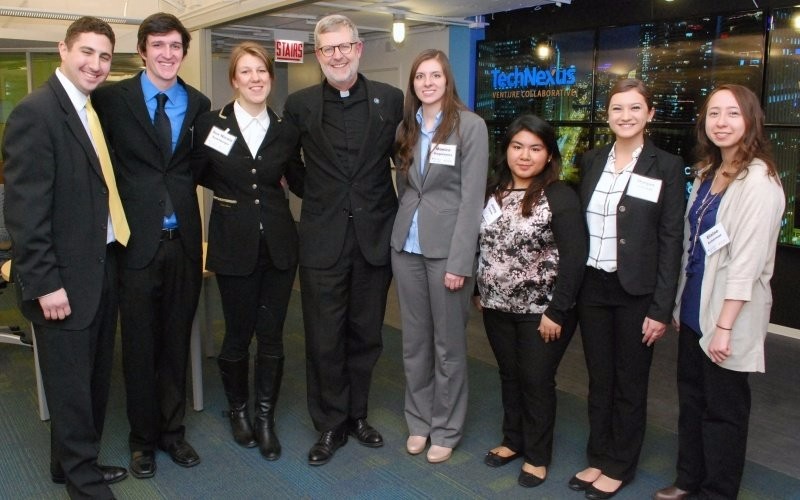
The Rev. Dennis H. Holtschneider, C.M. (middle), DePaul University president, with Student Innovation Award winners (L-R) Adam H. Grossman, David Allen, Sue Nicole Susenburger, Monica Grygorowiz, Jenny Fuerte, Morgan Schulhof and Elaine Ackerman. The awards are among a host of activities available for students studying entrepreneurship at DePaul.The Princeton Review has ranked DePaul University's undergraduate entrepreneurship program No. 12 in the nation, up three places from last year, in its survey of "Top Schools for Entrepreneurship Studies in 2016." DePaul's graduate entrepreneurship program placed No. 15, five spots higher than last year. DePaul was the only Illinois university to be listed in both rankings.
DePaul Coleman Entrepreneurship Chair Harold Welsch (BUS '66, MBA '68), founder and director of the entrepreneurship academic program at DePaul, says the programs are noteworthy because "we offer students a unique combination of classroom and real-world experiences,"
Real-World Learning
Though Alex Domnenko (BUS '04) just started DePaul's graduate business program this fall, he's already experienced the intersection of practical lessons mixed with structured education. Domnenko and his business partner started a home health care agency in 2013. But it wasn't until he took a class in DePaul's entrepreneurship program that he had to write a business plan and delve deeper into market research. It was this market research, Domnenko says, combined with other industry observations that convinced him to change his company's focus.
"Before I had to do the research in class, I had no idea how many home health care agencies there were in the area," Domnenko says. "I really wanted to do more research but I never had the time. But the program forced me to do it and allowed me to be accountable to myself."
The influx of home health care agencies triggered the state to hold a moratorium on licensing new ones. So Domnenko turned his company into a staffing agency instead. He found a gap in the industry that his company could fill.
Domnenko's experience is by no means unique. Welsch says the entrepreneurship program pushes students to think creatively and to envision innovative solutions for their chosen industries. Students say the program teaches them to find the opportunity, a niche that isn't being serve so that they can make their businesses successful.
"We teach our students to think outside the box," Welsch says. "We train both the left and the right side of the brain. We want them to think creatively and to use technology to help them be competitive in the marketplace."
DePaul's entrepreneurship programs have been distinctive since it began in 1982. DePaul currently offers 25 entrepreneurship-related graduate courses, and over the last five years, graduates have started 102 companies and have collectively raised $2.5 million in funding. Students and alumni also can receive practical guidance on how to start and grow new ventures from the Coleman Entrepreneurship Center at DePaul.
In addition to equipping students with the tools they need to run or start companies, the program also provides access to local entrepreneurs, many of whom are DePaul alumni. These entrepreneurs guest lecture, judge student business venture contests and mentor students. The relationship isn't a one-way street with local business professionals, either. Students have opportunities to provide highly valuable accounting, marketing and other advice to local business owners seeking help. It's a win-win for all involved, says Welsch.
The Princeton Review tallied its lists of the top 25 undergraduate and top 25 graduate schools based on a survey of more than 300 schools offering programs in entrepreneurship studies. The 60-question survey conducted from May through August 2015 looked at each school's commitment to entrepreneurship education inside and outside the classroom.
More than three dozen data points were analyzed for the rankings. Among them were the percentage of faculty, students and alumni actively and successfully involved in entrepreneurial endeavors; the number and reach of mentorship programs; and funding for scholarships and grants for entrepreneurial studies and projects.
More about the rankings can be found on the Princeton Review's website and in the December issue of Entrepreneur magazine.
Learn more about:
DePaul MBA entrepreneurship concentration
MS in Entrepreneurship